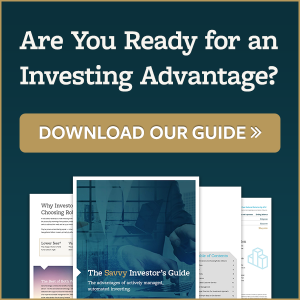Age Old Argument of Active VS. Passive Investing. Which is better for You?
November 15th, 2016 | Posted in InvestingWhen stepping into the world of wealth management, there are two big players: active and passive. Understanding the basics of each will ensure you choose the best strategy that fits your investment style and goals.

Understanding the Basics
The passive investing management strategy is not as involved as active investing, and can outperform active investing strategies due to lower trading costs, tax efficiencies and the advantages of utilizing broad based, diversified ETF’s in a balanced portfolio. Passive index investing is often considered the safer route due to the lower chance for human error. Passive index investing is a lot like having an investment on autopilot since indexes are balanced portfolio investing based on Modern Portfolio Theory can be less volatile than single stock investing, which demands more attention.
Active investing management often times walks the line of high risk/high reward, and offers the chance to be significantly more lucrative when run by an experienced asset manager. There is often quite a bit of trading involved, which drives up the expense of the account due to higher transaction costs that affect overall returns. The goal of an actively managed fund is to outperform the indexes, although there is no guarantee that they will.
Active VS. Passive
The goal of active investing is to beat the market. A good fund manager believes that because of their skill as an experienced investor utilizing in-depth research, they can often beat their benchmark. Prices react slowly to information which allows the experienced and skilled investor a chance to outperform the market. However, there is no guarantee that these strategies will work, and higher amounts of trade transactions come with higher fees. These fees and the potential for human error are the chances you take with an actively managed fund. However, in most cases, without a higher risk there is no higher reward.
Each investing model comes with its advantages and disadvantages, so it’s best to choose the one that fits your investment needs. The success of each is limited in its own way, either through high transaction fees or the slow returns of the index. Luckily, you don’t have to choose between the two because Zacks Advantage gives you the best of both worlds with a performance driven, low cost, automated actively managed wealth management service.
To learn more about Zacks Advantage, click here.
Learn more about how Zacks Advantage combines the simplicity and low fees of a robo advisor with performance-focused active management. Download our Overview Guide today!
Past performance is no guarantee of future results. Inherent in any investment is the potential for loss
Zacks Advantage is a service offered by Zacks Investment Management, a wholly-owned subsidiary of Zacks Investment Research. Zacks Investment Management is an independent Registered Investment Advisory firm and acts as an investment manager for individuals and institutions. All material in presented on this page is for informational purposes only and no recommendation or advice is being given as to whether any investment or strategy is suitable for a particular investor. Nothing herein constitutes investment, legal, accounting or tax advice. The information contained herein has been obtained from sources believed to be reliable but we do not guarantee accuracy or completeness. Zacks Investment Management, Inc. is not engaged in rendering legal, tax, accounting or other professional services. Publication and distribution of this article is not intended to create, and the information contained herein does not constitute, an attorney- client relationship. Do not act or rely upon the information and advice given in this publication without seeking the services of competent and professional legal, tax, or accounting counsel.
